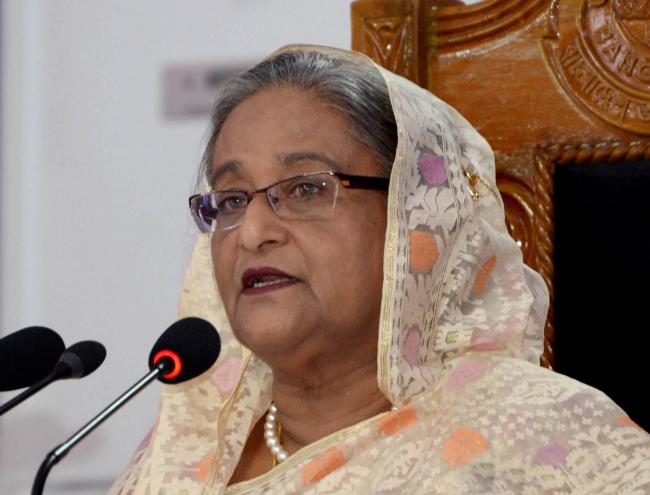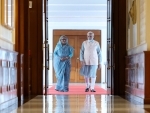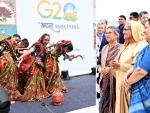Column

Global Women’s Leadership Award for Sheikh Hasina
The US-based Global Summit of Women conferred the prestigious award on Sheikh Hasina at a colorful function held in Sydney. The Prime Minister received the award from Global Summit of Women President Irene Natividad amid thunderous applause of around 1500 women leaders across the globe present at the summit.
It is worthwhile to note that last year the Japanese Prime Minister Shinzo Abe was given the award. Former UN Secretary General Ban Ki Moon and former UNESCO Director General Irina Bokova have also been among the recipients.
Women empowerment in Bangladesh has achieved commendable success in the last 10 years. The country has shown a consistent stepping up on the ladders of the global gender and human development indexes.
{special_block_1}The World Economic Forum (WEF) has ranked Bangladesh first in gender equality among South Asian nations for the second consecutive year. The WEF’s Gender Gap Index of 2017 highlights Bangladesh’s success in four key areas: education, economic participation, health and political empowerment. According to WEF ranking, Bangladesh ranks 7th among 155 countries in political empowerment of women and its place in gender gap index is 47.
Primary education in Bangladesh has been made compulsory and free for all. Overall enrollment in primary school rose to 98.7 per cent in 2016. Girls receive stipends and scholarships for schooling up to 12th grade. Text books are free. As a result girl students are well represented in the class room, the female to male high school enrollment ratio are now 53 per cent to 47 per cent, a dramatic increase from 35 per cent to 65 per cent prior to 2009. Bangladesh has also achieved Millennium Development Goal (MDG) of securing gender parity in education.
During the last ten years the Prime Minister has created opportunities for women in the civil service, corporate, development and entrepreneurship sector. With the passage of time women entrepreneurs are seen as an increasing entrepreneurial population in both urban and rural areas of the country.
Sheikh Hasina first drew international focus when the UN honored her with UNESCO Houphouet-Boigny Peace Award in 1998; a year after Bangladesh saw the end of a nearly two decade old insurgency in Chittagong Hill Tracts. Since then Sheikh Hasina has been keeping marks of her commitments to areas of global peace, climate change, agriculture, girls’ education and ICT, reintroducing Bangladesh to a global platform and installing the nation to an elevated seat in the international arena.
The international academic community also acknowledged her contribution with renowned universities in the US, Britain, Australia, Belgium and India conferring honorary doctorate degrees.
In 2010 Sheikh Hasina received the UN Award for achieving Millennium Development Goal (MDG) in curbing child mortality. In recognition to her continued commitment to the country’s development, she was conferred with the ‘ICT Sustainable Development Award’ for promoting the use of ICT towards achieving the UN Sustainable Development Goals (SDG) in 2015.
Women in Parliament (WIP) and UNESCO awarded her with ‘WIP Global Forum Award’ for her leading role in reducing gender gap in political sphere in South and South East Asia in March this year and ‘Tree of Peace’ Award for promotion of girls’ and women’s education in September 2014. She won the ‘South-South Award’ twice, one in 2011 and the other in 2013, for her contribution in reducing child and maternal mortality rates through using information technology in health sector and to fight against hunger and poverty.
She was awarded the Pearl S Buck award (1999), CERES Medal by FAO in 1999, Mother Teresa Award, MK Gandhi Award, Indira Gandhi Peace Award (2009), Indira Gandhi Gold Plaque, Head of State Medal, Global Diversity Award (2011, 2012) and Netaji Memorial Award (1997). Cornell University of the US awarded her with a Certificate in September 2014 for her contribution to attaining self-sufficiency in food production and ICT development. {special_block_2}
In addition to above Sheikh Hasina has been conferred with honorary Doctor of Liberal Arts by the University of Alberta, Dundee in the UK in 1997, and honorary Doctor of Laws by the Boston University in the US and the Waseda University of Japan respectively. Visva Bharati University of West Bengal, India conferred her with Desikottama (Doctor of Literature) while Australian National University awarded her the honorary Doctor of Laws in 1999.
Peoples Friendship University of Russia conferred her with honorary Doctorate degree in 2005 for her contribution in establishing peace, democracy and human rights. At home she was conferred with honorary Doctor of Laws by Dhaka University. Catholic University of Brussels offered her with identical honor in 2000.
She won the Champions of the Earth, the highest global accolade for environment, in 2015, as recognition to her farsighted programmes in tackling adverse impacts of climate change in Bangladesh. In 2016 she was conferred with ‘Agent of Change’ Award and ‘Planet 50-50 Champion’ honor for her outstanding contributions to women empowerment. The UN Women recognized the Prime Minister as ‘Planet 50-50 Champion’ while the Global Partnership Forum honored her with the ‘Agent of Change’ award at a reception at the UN Headquarters in New York that year.
Women in Bangladesh are now playing far greater role than any time before in different sectors such as education, administration, healthcare, military and para-military services as well as politics and business. The awards for Sheikh Hasina are actually the recognition of progress that the country’s women have achieved in different fields. Under Sheikh Hasina’s dynamic leadership Bangladesh is now few among the South Asian countries that is on target for achieving most of the Millennium Development Goals and is considerably ahead of target on some indicators.



